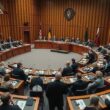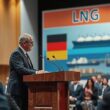The latest ZDF Politbarometer reveals a concerning shift in German political sentiment, with the traditionally dominant CDU/CSU experiencing a decline while the far-right Alternative for Germany (AfD) gains traction. Should a federal election occur next Sunday, the poll indicates a near-tie, with CDU/CSU currently polling at 26% (down 1 percentage point) and the AfD also at 26% (up 1 percentage point).
This represents a significant development, highlighting a continued erosion of support for the center-right bloc and a burgeoning challenge from a party frequently associated with nationalist and anti-immigrant rhetoric. The findings, based on interviews conducted between November 4th and 6th, 2025, involving 1,322 eligible voters via telephone and online platforms, underscore a broader trend of voter dissatisfaction and potentially reflect deeper anxieties within German society.
The Social Democratic Party (SPD), currently in coalition government, also suffers a slight setback, registering at 14% (down 1 percentage point). The Green Party manages a marginal increase to 12% (up 1 percentage point), suggesting a degree of resilience but falling short of a decisive resurgence. Die Linke remains steady at 10%, while a collective of smaller parties, including the recently formed BSW and the Free Democratic Party (FDP), aggregate to 12%, with no single entity exceeding the 3% threshold required for parliamentary representation.
Critically, the projected outcome based on this polling data would preclude the formation of a stable parliamentary majority for the traditional “black and red” coalition (CDU/CSU and SPD). This potentially volatile situation raises questions about the long-term stability of the German government and the potential need for significant political realignment. The surge in AfD support warrants close scrutiny, demanding a critical analysis of the underlying factors – including economic anxieties, concerns regarding immigration policy and a perceived disconnect between the establishment and ordinary citizens – driving this trend and placing increasing pressure on the established political order.





